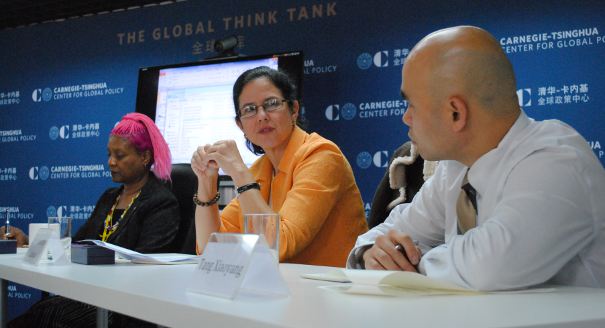Registration
You will receive an email confirming your registration.
China’s increasing role as a donor in the African continent has fueled speculation that Beijing is competing against Washington for influence in these countries. However, trilateral development projects allow for both countries to cooperate in aiding developing countries in Africa.
Carnegie-Tsinghua’s Tang Xiaoyang hosted a panel consisting of representatives from Sister Cities International, the trilateral city partnership of Asheville and Raleigh in the United States, Xiangyang in China, and Osogbo in Nigeria. This program is also partnered with the United States Agency for International Development (USAID). The panelists discussed the current state of development aid and opportunities for collaboration between the three regions.
Guiding Principles of Development Aid
A sustainable model for development aid must follow some basic guidelines in order to be accepted by all parties, panelists agreed.
- Empowering Local Population: Valeria Watson-Doost of the Asheville-Osogbo Sister Cities Committee noted that recipient countries are wary of donors who exert too much control over the allocation and execution of development aid. Instead, she added, donors must use people-to-people connections to conceive and carry out projects that truly benefit the recipient state.
- Sustainability: James Montague of the Raleigh-Xiangyang Sister Cities Committee explained that development projects should be sustainable. In order to build lasting facilities and infrastructure, donors need to take into account how locals actually do business. He added that using funds from an initial project to invest in subsequent projects ensures a sustainable transfer of money.
- Donor Benefits: Panelists from both China and the United States emphasized the importance of each country’s domestic interests. A participant from Raleigh explained that he had to convince other residents of Raleigh that investing in the trilateral cooperation project would benefit their own community. Similarly, a participant from Xiangyang emphasized to his local business community the strategic importance of Osogbo as a potential market.
Challenges to Development Aid
Previous experiences and mistakes on the part of both donors and recipients have revealed many challenges and barriers to truly beneficial development assistance.
- Facilitating Communication: Lula Chen, a representative of Sister Cities International, explained that many African cities, although interested in cooperation, worry that donors will ignore their input and objections. To remedy this, Sister Cities International created a way for the recipient cities to identify areas of cooperation and take greater ownership of development projects.
- Possible Competition: Participants assuaged fears that China and the United States would use development aid to compete for spheres of influence in Africa. Maria Rendon-Labadan, a representative from USAID, emphasized that the agency works closely with the Chinese Ministry of Commerce. She listed cooperation between the two sides in providing agricultural assistance in East Timor as an example.
Benefits of Trilateral Cooperation
Aid relationships are typically bilateral, but Sister Cities International representatives explained the benefits of adding third parties to these traditionally bilateral relationships.
- Donors Exchange Information: Tang noted that China’s aid model is very new compared to those of traditional donors, and certainly needs to be refined and improved. This was echoed by Watson-Doost, who emphasized that China is willing to learn from the United States in order to create a development model that benefits its own domestic policies as well. The representative from USAID agreed, adding that the U.S. model also still has room to improve and evolve.
- Countries Have Different Expertise: Chen explained that China and the United States have different focuses when it comes to development aid. For example, China focuses much more on infrastructure. These different focuses arguably work to the benefit of the recipient, as trilateral cooperation allows the strengths of the different donors to complement each other to create more comprehensive development.
- Keeps Donors Honest: Montague noted that the presence of multiple donors prevents any donor from taking advantage of the local situation. The accountability provided by the presence of multiple donors ensures that projects carried out are more likely to benefit the recipient.
